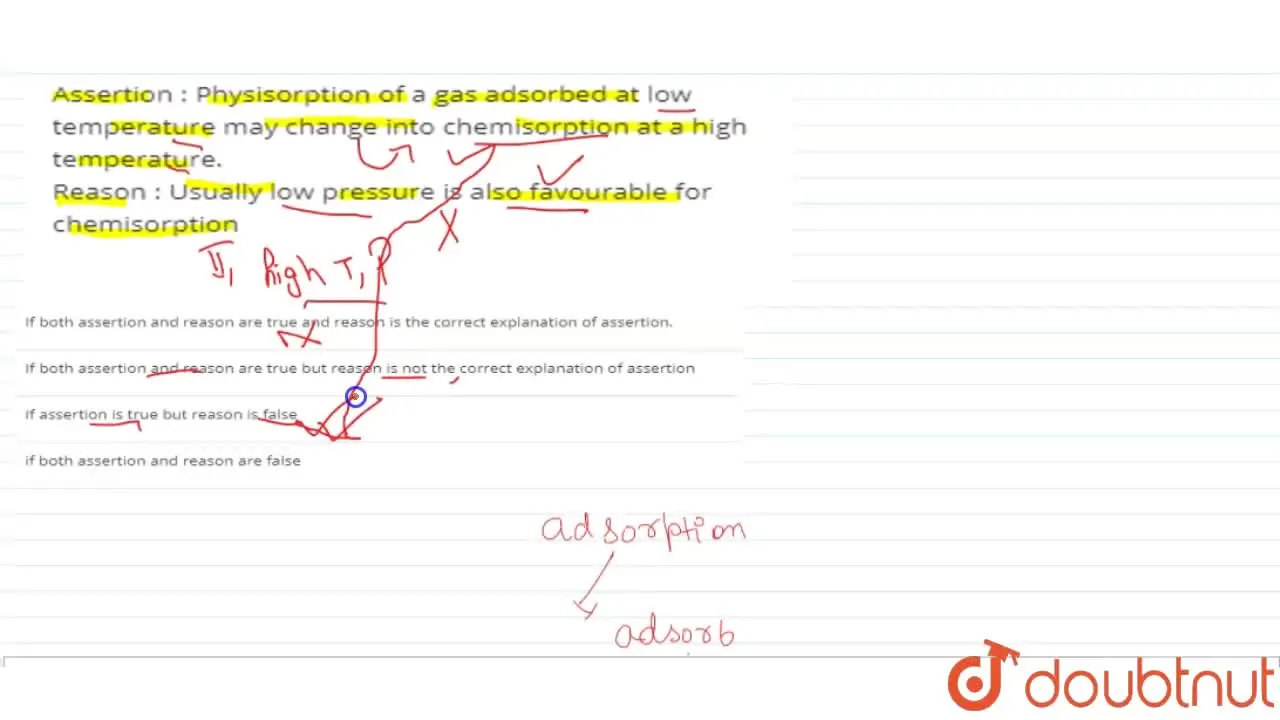Assertion : Physisorption of a gas adsorbed at low temperature may change into chemisorption at a high temperature.
Reason : Usually low pressure is also favourable for chemisorption
If both assertion and reason are true and reason is the correct explanation of assertion.
If both assertion and reason are true but reason is not the correct explanation of assertion
If assertion is true but reason is false
if both assertion and reason are false
The correct Answer is:C
Usually high pressure is also favourable for chemisorption .
Related Playlists
- BOOK - NCERT FINGERTPS ENGLISHCHAPTER - SURFACE CHEMISTRYEXERCISE - Adsorption26videos
SURFACE CHEMISTRY
- BOOK - NCERT FINGERTPS ENGLISHCHAPTER - SURFACE CHEMISTRYEXERCISE - Catalysis14videos
SURFACE CHEMISTRY
- BOOK - NCERT FINGERTPS ENGLISHCHAPTER - SURFACE CHEMISTRYEXERCISE - NCERT EXEMPLAR PROBLEMS25videos
SURFACE CHEMISTRY
- BOOK - NCERT FINGERTPS ENGLISHCHAPTER - SOLUTIONS EXERCISE - Assertion And Reason15videos
SOLUTIONS
- BOOK - NCERT FINGERTPS ENGLISHCHAPTER - THE D- AND F- BLOCK ELEMENTS EXERCISE - Assertion And Reason15videos
THE D- AND F- BLOCK ELEMENTS
Similar Questions
Low temperature is favourable for ……….. reactions.
View SolutionLow temperature is favourable for ……….. reactions.
View SolutionLow temperature is favourable for which type of adsorption ?
View SolutionAt high temperature and low pressure van der Waal's equation becomes
View SolutionThe correct statement(s) pertaining to the adsorption of a gas on a solid surface is(are)
(i) adsorption is always exothermic
(ii) physisorption may transform into chemsisorption transform into chemisorption at high temperature
(iii) physisorption increases with increasing temperature but chemisorption decreases with increasing temperature .
(iv) chemisorption is more exothermic than physisorption , however it is very slow due to higher energy of activation.View SolutionAssertion (A): The endothermic reactions are favoured at lower temperature and the exothermic reactions are favoured at higher temperature.
Reason (R ) : when a system in equilibrium is disturbed by changing the temperature, it will tend to adjust itself so as to overcome the effect of the change.View SolutionAssertion : Inorganic catalysts work efficiently at high temperature.
Reason : Enzymes get damaged at high temperature.View SolutionGiven an example where physisorption changes to chemisorption with rise in temperature. Explain the reason for change.
View SolutionAssertion : An exothermic process which is non-spontaneous at high temperature may become spontaneous at low temperature.
Reason : Spontaneous process is an irreversible process and may be reversed by some external agency.View SolutionAssertion : At high altitudes , liquids boil at lower temperatures in comparison to that at sea level .
Reason : At high altitudes , atmospheric pressure is low .View Solution


